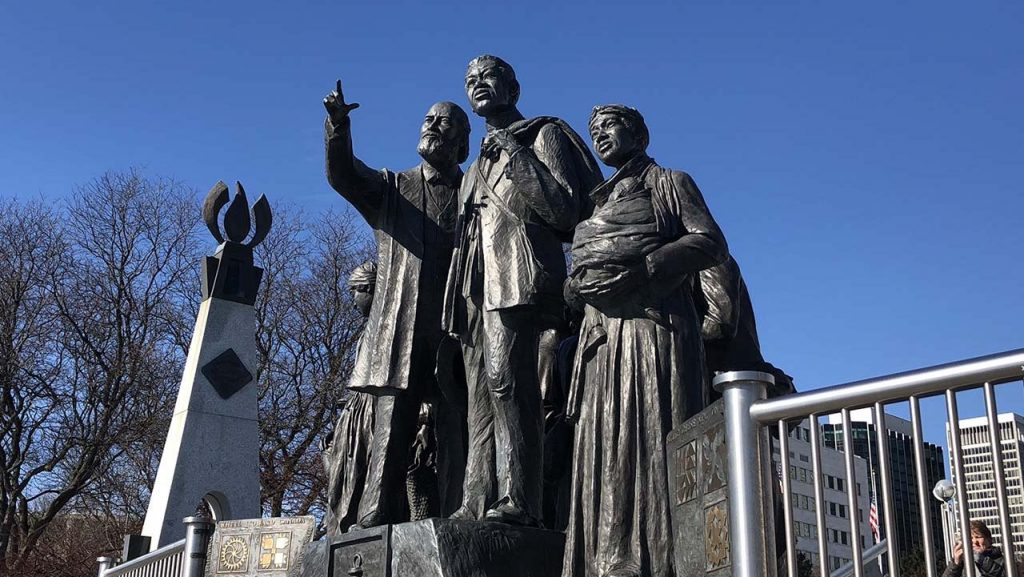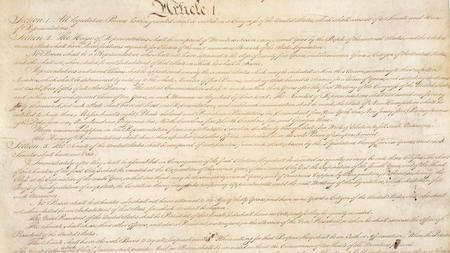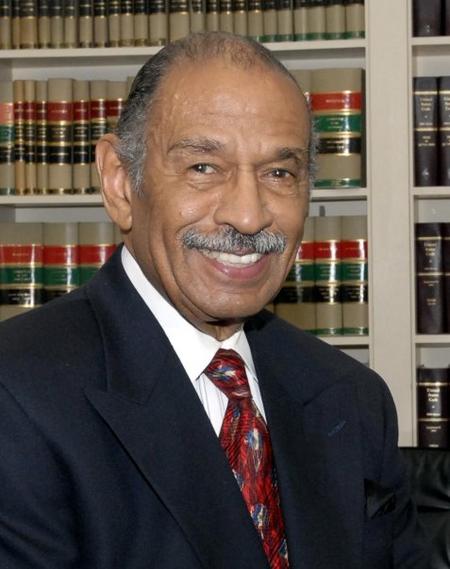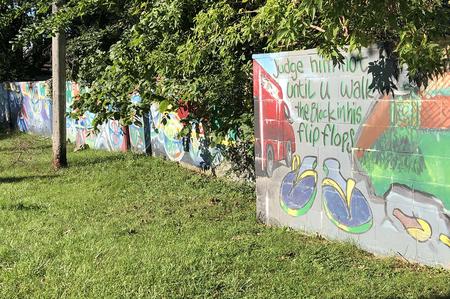Local Leaders Try to Undo Racism Embedded in Constitution By Seeking Reparations
The 14th Amendment granted citizen rights to former slaves, but leaders like the late John Conyers say the country never truly healed from the era of legal slavery.

“The Gateway to Freedom,” an international monument to the Underground Railroad by artist Ed Dwight, sits along the bank of the Detroit River in Detroit.
As part of 101.9 FM WDET’s Book Club, we’re inviting the Detroit region to examine and discuss the text that impacts every resident of the United States: The Constitution. Whether you’re revisiting the documents or reading them for the first time, join us in reading along and engaging in civil conversations with your community.
Get your free pocket Constitution »

The Constitution laid the foundation for law in this country, and its words still resonate today even as certain passages upheld societal inequalities. It doesn’t require much reading to see how America’s Founding Fathers codified chattel slavery. Most kids learn about it by middle school: the three-fifths compromise. It’s in Article One of the United States Constitution. It distinguishes the difference between “free persons…” who were to be taxed and represented fully, while so-called “other persons” were given a fraction of the count.
In 1999, John Conyers, the longtime U.S. representative from Detroit, hosted a forum on government reparations to African Americans.
“The Constitution started off excluding us. The Constitution now includes us,” he said.

The 14th Amendment granted citizen rights to former slaves, overriding the three-fifths compromise. But Conyers said the country never truly healed from the era when slavery was legal.
“We here now, free men and women, are picking up the cudgels. Not only for our ancestors but for the very men that put together the framing of this Constitution,” he said.
In 1989, Conyers introduced HR 40, a bill to establish a commission to study and develop reparations for African Americans. He’d reintroduce that bill every year until his death in 2019. While it never reached the House floor, the national conversation around reparations continues.
Keith Williams, the chair of the Michigan Democratic Party Black Caucus, supports local reparation programs like the one recently passed in Evanston, Illinois, the first city in the country to do so. Williams says Michigan has its own sordid history of enslavement. William Macomb, an 18th-century fur trader, was among the area’s earliest slave owners.
“Then subsequently Cass, Dequindre, Livernois, they followed him being slave owners,” Williams says.
According to Williams, racist practices evolved after slavery; local politicians crafted policies for discrimination as Detroit’s Black community grew.
“Even before Black Bottom, the Birwood Wall separated Blacks from white people. Up until 1970, Black folks couldn’t even live in Rosedale Park. Look at the schools’ takeover. Who’s [borne the] brunt of all that? It’s been African Americans.”
Now some are hoping to make reparations a political reality in Detroit. City Council President Pro Tem Mary Sheffield says there’s momentum for the issue after the last presidential election.
“And then you had the death of George Floyd where you saw a lot more millennials and younger people start to get engaged in this fight for social justice,” she says.
Sheffield introduced a resolution to draft a ballot proposal for a Detroit reparations committee. She says if approved by voters, it would not guarantee the committee’s creation. But it’s the beginning of the conversation and a way to gauge support.
“There’s a possibility of using sales tax from the recreational marijuana as a stream to actually fund this,” Sheffield says.
Adopting the new city charter under Proposal P would also create a reparations committee in Detroit.
As the two questions head to the polls, voters will have the opportunity to pave the way for their own version of Conyers’ reparations bill. And take their own steps toward local restorative justice.
Listen: The Constitution and the road to reparations.
Join WDET in reading the Constitution.
This summer, we invite you to get involved as we explore our nation’s founding document.
Sign up to get your free pocket Constitution
Trusted, accurate, up-to-date.
WDET strives to make our journalism accessible to everyone. As a public media institution, we maintain our journalistic integrity through independent support from readers like you. If you value WDET as your source of news, music and conversation, please make a gift today.

